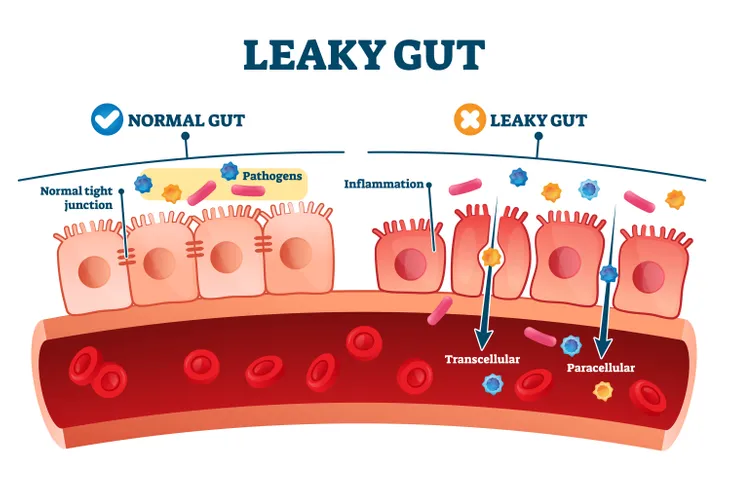The world of medical science is a lot more unpredictable than the layperson might think. Be it an accidental discovery, the product of technological advancement or fervent internet discussions, it’s hard to say where the next breakthrough might come from. Leaky gut, for example, is all the rage these days on health blogs, podcasts, and medical journals. And yet, most doctors don’t recognize it as a verified medical condition.
But, almost in spite of the medical community’s tentative approach, the conversations surrounding leaky gut and its impact on our collective health persist. Today, we’ll take a look at what we do know about, what we think we know about, and what you can do about leaky gut.
What Is It?
Though the term “leaky gut” sounds awfully colloquial, you just have to hand it to whomever coined the name, because it sure is on-the-nose. Let us start with you gastrointestinal tract (GI), which stretches from the mouth to anus, with the esophagus, stomach, and large and small intestines in between. This system’s job is to process everything that we put in to it, extract the important nutrients, and filter out all of the stuff that the body doesn’t use as fuel.
Leaky gut allegedly comes in to play once the food that we eat passes through to the intestines. You see, the intestines are supposed to have microscopic openings designed to finely extract only the most important nutrients in to your bloodstream. With leaky gut, those openings are larger and as such, do a shoddy job of protecting what is and is not absorbed into the bloodstream.
Symptoms
It’s important to stress that leaky gut, or “increased intestinal permeability” is not yet fully recognized by the medical community at large. Which makes finding concrete symptoms, causes, and treatments a dubious task.
That hasn’t stopped leaky guts list of symptoms from growing. Possible symptoms associated with leaky gut include:
- Digestive issues including gas, diarrhea, and bloating
- Hormone imbalance
- Autoimmune disorders and diseases
- Chronic fatigue syndrome
- Food sensitivities
- Joint pain
- Inflammation
Causes
Leaky gut syndrome occurs in the GI tract, which means much of the conversation around causes centers around diet. The science is in its infancy, but there is growing evidence that the low fiber, high sugar composition of the standard American diet is partially to blame. Other potential contributing factors include stress as well as heavy alcohol use.
Uncontrollable health factors that may increase an individual’s preponderance to developing leaky gut syndrome may also include diabetes and autoimmune disorders like lupus.
Treatments
Because leaky gut is barely acknowledged by the medical community at large, there aren’t many prescribed or over-the-counter treatments available at the pharmacy. That’s not to say that there’s nothing to do to combat the cacophony of symptoms.
As previously mentioned, the information that is available points to diet as the primary contributor to the development of leaky gut. So it shouldn’t surprise anyone to hear that diet changes are the number one priority. The key is to eliminate processed foods, high-fat foods, high-sugar foods, and alcohol. You might also want to add foods that are rich in probiotics, like kefir, kimchi, bananas, berries, kombucha and probiotic yogurt.
Future of Leaky Gut
This is some real, cutting edge health science stuff and we’re watching it play out in real time. There may be a day when medical doctors, internet bloggers and health and fitness nerds come together and point to gut health as the primary area of concern when it comes to a healthy lifestyle.
We aren’t quite there yet though. But hear me out. Let’s say the opposite proves to be true and the scientific community comes down with real, tangible evidence that “leaky gut” is nothing more than a product of internet ennui. You’ll still feel better having eliminated high-fat foods, high-sugar foods, and alcohol from your diet.








